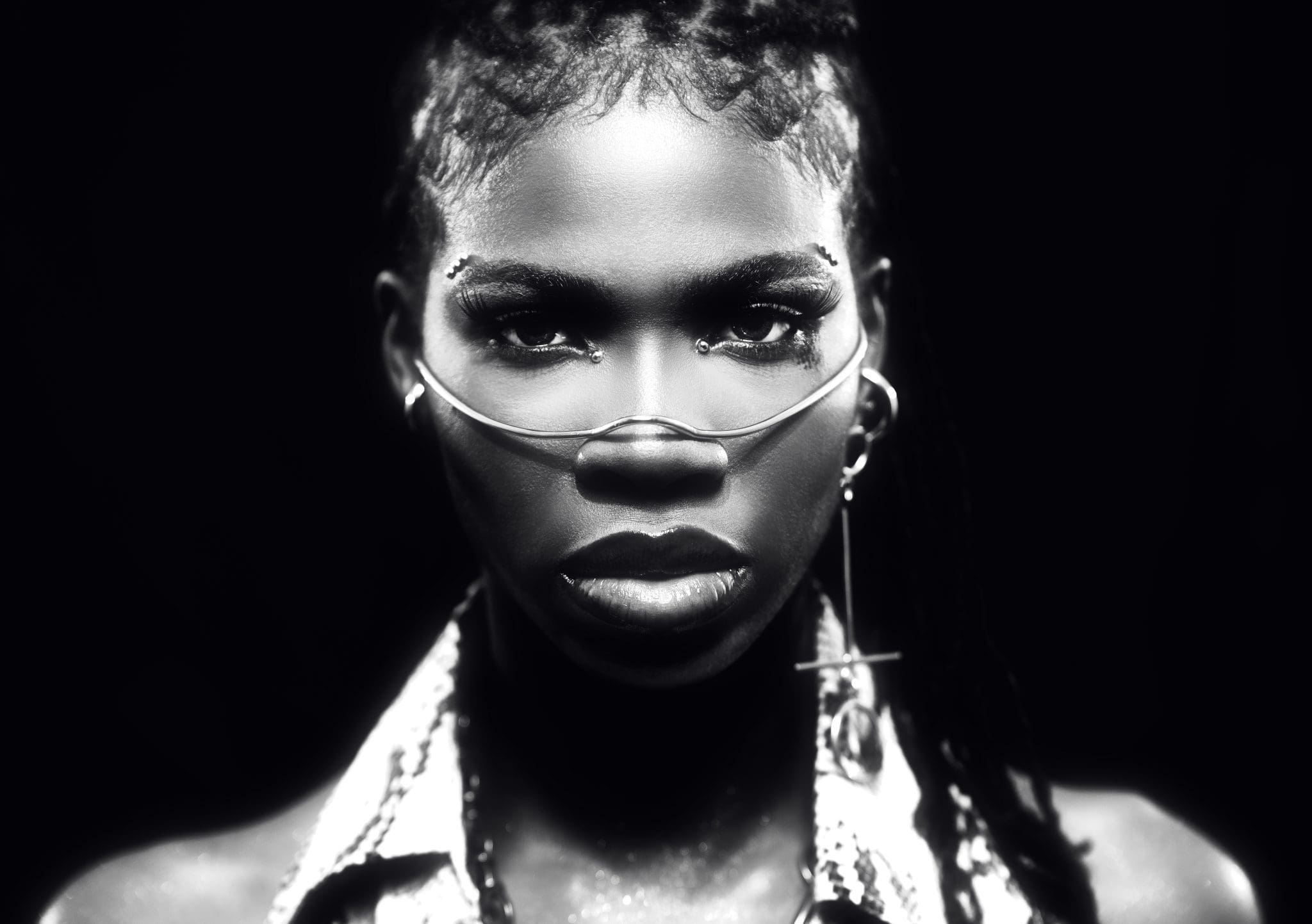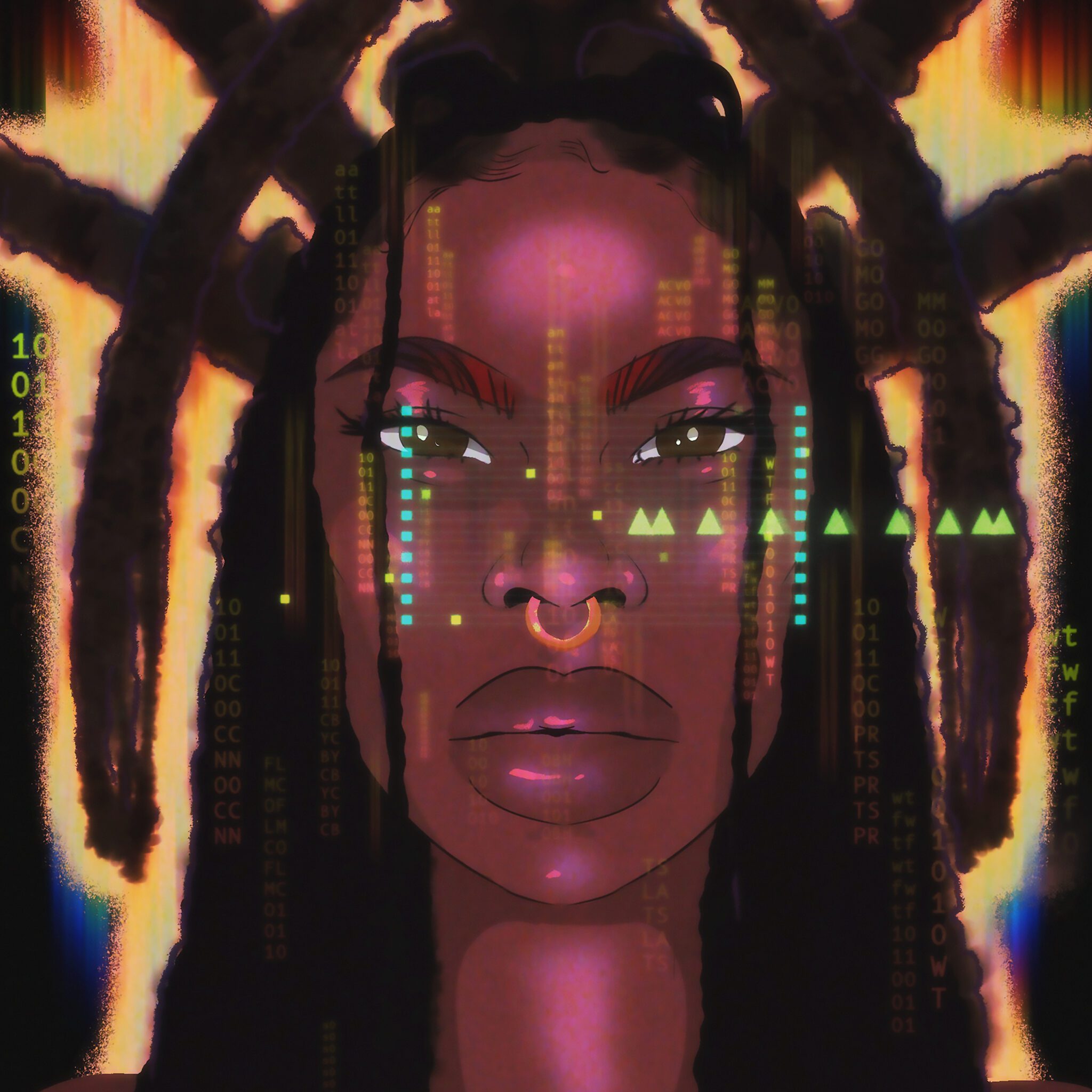Toronto x Brampton multi-award-winning artist/producer/DJ Haviah Mighty has shared her latest project, Stock Exchange, the follow-up to her Polaris Music Prize-winning album 13th Floor. The mixtape highlights Haviah’s expansion as a producer and features a cast of incredible collaborators, including North Carolina’s Jalen Santoy, LA-based Old Man Saxon, Toronto artists Grandtheft, TOBi, Spanish artist and Latin GRAMMY winner, Mala Rodriquez, UK artist Yizzy, and more.
The title for Stock Exchange refers to a realization Haviah had over the grip that social media, streaming platforms, numbers, and analytics hold over artists in our digital landscape, “These statistics that we use to compare ourselves to others and to define our successes, have become proof of our worth. It’s all perception. These ideas around perceived value got me thinking about the Stock Exchange. Seeing parallels between the way it flows – the constant rising and falling – all dictated by the general public’s perception of an entity’s value, and ultimately how that influences the moves that we make as individuals.”
Following the rapid career growth Haviah saw post-Polaris Music Prize, the past year forced her to look inward as we collectively entered lockdown and the music industry came to a halt. In Stock Exchange, we see the result of Haviah taking control of the creative decision-making and telling her own stories as she explores the self-confidence she’s discovered within. We sat down with Haviah to talk about what she’s learned through the process of creating Stock Exchange, the value of self-validation and a strong sense of knowing yourself, and how she will continue sharing her narrative with the world.

Haviah Mighty photo by Yung Yemi
The title, Stock Exchange, refers to the data-driven landscape of the music industry and how artists are forced to validate their art through numbers. As an artist, how do you maintain your connection to your art in this digital heavy environment?
I think by trying to intertwine my art with the understanding and learning of the digital environment that we’re in, that transition that we’re seeing and bridging those worlds together is definitely a way that I’ve done it with this last release. I recognized it as I was rolling these singles out, and that kind of led to the singles becoming a body of work, where initially it wasn’t intended to be that and it was just because I was noticing that shift of the landscape. So bridging that is definitely one way. I think, in other ways, I just try to find new ways to connect with fans and new ways to connect with the music…But the biggest way I would say that I’ve done it recently is with Stock Exchange, and recognizing that pattern with my own releases, compiling the songs, and naming the record something that ties that concept in.
How do you separate something like data and streaming analytics from yourself and your art?
At the beginning of putting these songs out, it was difficult, because we were getting used to a new environment and losing that human connection. So each time a song was released, it was only validated by these digital stats and analytics. And it was disheartening because, you know, you put out one song, and it does really well on one social media platform, but maybe not well on another. Then you put up another song, and how well it does is relative to the last one. It kind of shifts your mood for that month and your value of self for that period of time. I was noticing that was happening with these releases. I learned to – and I’m still learning to – balance that feeling by learning how to validate myself in other ways, so that I’m not seeking validation from digital entities.
I do realize that it’s still important to pay attention to numbers and stuff from a business perspective. And that’s kind of what Stock Exchange is. It’s like the separation of understanding what it means to be successful in business. Still being aware of the streams, the comments, the fan engagement, because that stuff does matter. How much people are enjoying what I’m doing really does matter, and some of that information is translated through digital entities. What isn’t translated is the value of your work, the impact of your work, or the value of self. Those things aren’t intrinsically implicated through digital.
So the separation for me was learning how to find that validation with myself in other ways that are not even related to music so that music is not the only thing. And that other people’s opinions aren’t the only things that validate me. I validate myself in other ways by cooking a meal that tastes really great, or reading a book that expands my mind, things like that which take me outside of only being validated in this world of creating music.
[youtube https://www.youtube.com/watch?v=YN2LduUv3tg]
Watch So So, the latest video from Stock Exchange
You’ve had a hand in the entire creation process of everything you’re working on, you’ve collaborated with an incredible group of people and are flexing your muscles as a producer on this project. When you’re collaborating with others, how do you ensure that your creative voice is heard throughout the entire process?
I’m super involved in the process, where I did a little production on 13th Floor, I was much more heavily involved, I would say, in the production process of Stock Exchange. The lack of resources kind of made it so that I had to make a lot of these decisions on my own. So that increased my involvement and made sure that my opinions, my voice, my themes, everything was heard, because I didn’t really have the resources or a co-producer or anything like that, to assist in that process. It was challenging, but it was interesting for sure, to rely on myself for a lot of what the project meant and what it stood for with very little input just due to the times and circumstances.
What do you think you learned about yourself as an artist by being in the driver’s seat and having to make more of your own decisions?
I think what I learned is that it’s quite challenging and that there are pros and cons to working with yourself and validating yourself. It was interesting with 13th Floor, I had people more involved on the back end. I was very, very involved and I wasn’t silenced in what it is that I wanted to say. But I had a lot of assistance on the back end and studio sessions in person with other people.
Stock Exchange was the opposite where I was curating the whole idea, but I reached out to many more artists as collaborators, and I was more involved in the production process. So I had more say in different parts of the curation of this project. What I learned is every element of creating a project is unique, but it has its own challenges.
I love having the ability to work with the experts of a facility, I’m not the expert of, like, getting playlisting for a song of mine, or the expert of creating the music video, for example. So I love the idea that you can pick the right people and work with them. What I learned from having to do so much is that I really like working with other people and that they add a lot of value. But I also learned I can count on myself if I have to create because I love to involve myself in many different aspects of music creation. From the recording of my vocals to producing, I was able to meet my own expectations with this project. But I’m really looking forward to being able to re-establish new ways of connecting with people. With this project, I got to work with more people in a different way than my last body of work. That was really enlightening, and to me, beneficial for all of the records to have people add their perspectives to the songs.

Stock Exchange artwork
I’ve been following your career for the past few years. I’ve seen you perform many times and you always stick to your roots by repping where you’re from and having pride in your community. As your career continues to grow, how do you remain authentic? And why is that important to you?
I was born in Toronto. So I always say that’s a part of the story too because a lot of the stories that I tell do come from those first eight years of growing up in Toronto, but also, so many of those stories also come from moving to Brampton and still living there. There was a lot of transition that happened between living in those two different regions; the areas, the time, and also the status. As a family, moving to Brampton was like, we can afford a better home, it was that sort of transition. So it’s all a part of the story.
I feel like sometimes the simplicity of your story is a really big part of your story as well. For me, I look at a lot of these experiences as vastly different. I think Toronto was a bit more rooted in some of the trauma that I speak to because of the environment, racism, classism, vandalism of property, like the targeting of us being the only Black family in the area. Whatever emotions were kind of festering, I can’t even call them because we moved when I was eight. But I know that origin is kind of what left this nature in me, where I always want to speak to unfairness and injustice. I really think that comes from those experiences.
But then moving to Brampton, it was like change overnight. It was multicultural. I was allowed to, like, go outside and go to the park and play basketball, I was able to socialize. I feel like I was a bit of a late bloomer because I was able to express myself as a young child in a more open way only after leaving Toronto. Not because Toronto is overall terrible, it was just the circumstances of the area. Those were vastly different experiences, so I feel like it really adds to the complexities of different things that I like to talk about. I guess those things just become a part of what is important for me to share.
I’m really grateful that in the beginning of my recognizable career, like the part where people know of me, is the part where you’re getting a little bit of that origin story of me. Hopefully, it’s a good introduction to people to get a sense of who I am. So that if I do write about other things or pivot to other things, I’ve started with my origin story, and I can diverge from them. I’m grateful that I’ve had the opportunity to do that. People are interested in what I have to say.
[youtube https://www.youtube.com/watch?v=WE74hqriqmI]
Watch the video for Protest Ft. Yizzy
How do you envision your narrative growing from here? People can get a sense of your roots, and your origin story, and then it’s gonna grow from here. Do you have any sort of vision in mind for how that might go?
I think the things that matter to me don’t change, but they’re expanding for sure. I’ve talked a lot about political issues on 13th Floor and some of that spilled into Stock Exchange. But with Stock Exchange, you see a growth around the topic of self-validation, and that is because the times mandated that for me. Like, I’ve pivoted from being so busy and being able to distract myself with shows and all the things that were going on to no distractions at all.
I think what was interesting for me, was recognizing that I didn’t know what my story was outside of being a musician. It’s very difficult to answer that question. I remember having a conversation with a friend who was like, “who are you outside of music?” and it was kind of impossible for me to make myself sound interesting in this conversation context, outside of music. And I realized that balance is necessary for us to have.
At the time, after winning the Polaris Music Prize, I was just focusing on the trajectory of going up and maximizing my dreams. So, the world being forced to pivot definitely forced me to pivot. And I had to go within rather than allowing myself to be distracted by things that were happening externally. A lot of that led to Stock Exchange. But I think there’s a lot within that I haven’t fully explored yet, which over the next year or two will be the things I explore. And with that – I don’t think I can really fathom the next body of work at this point. I haven’t started as of yet.
I think people know a lot about my opinions. They know a lot about my passions. They know a lot about, you know, the style of music or the chord progressions. But what do they know about me as a person? I’m really interested in conveying that into music. How that will be done – I don’t know. But I’m looking forward to it. And because I’m also learning who I am, at the same time, so I feel like it’d be a really introspective journey that will become audible pieces of work.
Listen to Stock Exchange here

